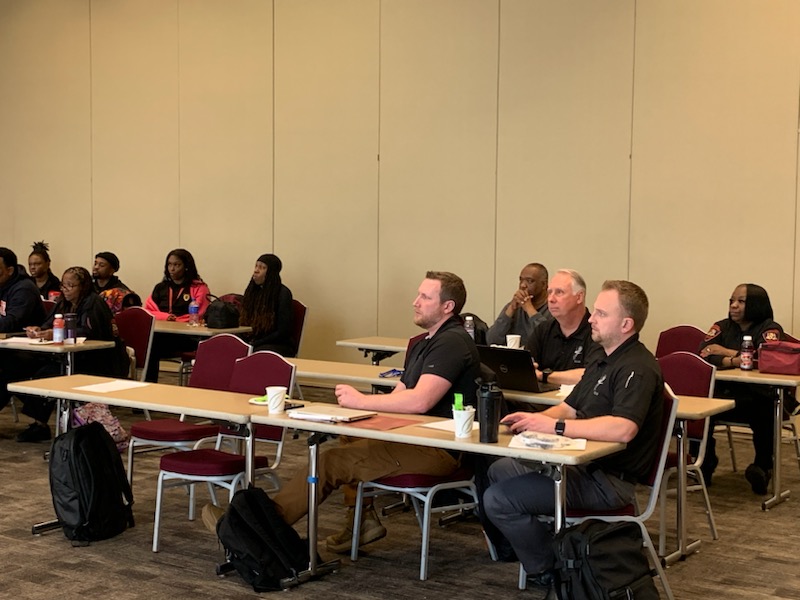UMBPD Leads Collegiate Communications Centers
April 05, 2023 Carin Cardella
Celebrating the accomplishments of UMBPD’s police communications operators including training efforts.
Police communication centers at colleges and universities across Baltimore City are making huge advancements thanks to the leadership of the University of Maryland, Baltimore Police Department (UMBPD). Police communication supervisor Shawnta Privette, MSL, has been paving the way to create a culture of excellence among collegiate communication centers.
“No official training existed for collegiate communications centers. PCOs were influenced by Baltimore City Police dispatcher interactions on the radio, or they developed an understanding by researching various dispatch methods, but there was not structured training,” Privette says. “We’ve been creating that structure through in-service trainings and individual educational achievements.”
Historically, UMBPD’s police communications operators (PCOs, also called dispatchers) worked at a sergeant’s desk with a brass gate in the lobby of 214 N. Pine St. They managed access to the building and received visitors for command staff. In 2014, the department drafted a plan to move the PCOs into their own space in 222 N. Pine St., the former University bookstore. The center was relocated in 2018.
Privette says this move allowed PCOs to support their responsibilities more effectively. “They gather information and provide pertinent information to our officers — administrative functions — but they also monitor alarms, monitor cameras, provide building access, listen to radios, and more. The responsibilities at UMB are far greater than responsibilities I had as a BPD [Baltimore Police Department] dispatcher and dispatch supervisor. Responsibilities such as CCTV and alarm monitoring were coordinated by employees outside of communications, so I was not responsible for those functions.”
This extensive knowledge and experience make UMBPD’s PCOs well-suited to build trainings for other colleges and universities. Privette, PCO Ashley Combs, and PCO April Carter are certified instructors who continually support training within and outside of communications.
Beginning in 2018, dispatchers from Coppin State University, Morgan State University, Johns Hopkins University, University of Maryland, Baltimore County, and Baltimore City Community College come to UMB twice a year to receive training on radios, an overview of laws that impact the National Crime Information Center (NCIC), Association of Public-Safety Communications Officials (APCO) standards that support the evolution of the communications, and more.
“We became a resource for PCOs at other universities,” Privette says. “A collaborative in-service training didn’t exist until UMB created it.”
In February 2023, UMBPD PCOs again paved the way by hosting a radiation training to include Baltimore City Police dispatchers. Baltimore City 911 Center is the primary Public Safety Answering Point (PSAP), which means they are the primary call center responsible for receiving 911 calls in Baltimore City, and other local colleges.
“All emergency calls go to Baltimore City 911 Center due to Kari’s law, so we want to be sure to build strong relationships between the city and UMB,” Privette says. In the past, there hasn’t been a lot of collaboration between Baltimore City’s 911 center and secondary PSAPs, like at UMB. That all changed through the Aware Portal partnership.
UMB and Baltimore City police officers receive radiation training, but UMB and Baltimore City dispatchers have not often received radiation training in the past. Radiation calls are handled differently, so training is vital for dispatchers and 911 call-takers. Education and Training Lt. Todd Ring, MSL, understood the importance of collaborative training. In September 2022, he included UMB and Baltimore City dispatchers in the training exercise. This proved beneficial to all agencies and served as the foundation for additional training.
“It’s historic for us to have this radiation training and to include Baltimore City,” Privette says. “Although we’re the subject matter experts, the success of responding to these types of calls is all about collaboration and training.”
UMB PCOs are using their knowledge and innovative approach to training to not only improve their own communications center, but also those in the region. PCOs have been recognized for their good work as a unit and individually. In February 2023, Privette was named UMB Employee of the Month. In March 2023, a PCO lead, a PCO, and a PCO trainee received commendations for their vital role in dispatching officers to a man having a medical crisis.
Senior Vice President Dawn Rhodes, DBA, and Assistant Vice President for Public Safety and Chief of Police Thomas Leone, MSL, are champions of UMB’s PCOs. The department is one of the most progressive with hiring and staffing. It will now have three to four PCOs per shift.
“Policing is changing, and collegiate dispatching has to change with it,” Privette says. “We’re evolving and we’re helping our fellow dispatchers to benefit from our experience. It makes all the difference.”